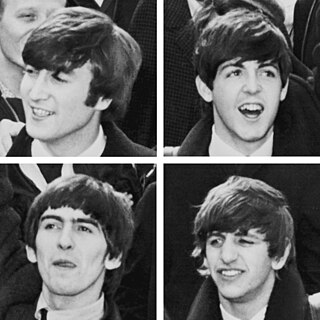
The Beatles were an English rock band formed in Liverpool in 1960. The core lineup of the band comprised John Lennon, Paul McCartney, George Harrison and Ringo Starr. They are widely regarded as the most influential band in Western popular music and were integral to the development of 1960s counterculture and the recognition of popular music as an art form. Rooted in skiffle, beat and 1950s rock 'n' roll, their sound incorporated elements of classical music and traditional pop in innovative ways. The band also explored music styles ranging from folk and Indian music to psychedelia and hard rock. As pioneers in recording, songwriting and artistic presentation, the Beatles revolutionised many aspects of the music industry and were often publicised as leaders of the era's youth and sociocultural movements.

The fifth Beatle is an informal title that has been applied to people who were at one point a member of the Beatles or who had a strong association with John Lennon, Paul McCartney, George Harrison, and Ringo Starr.
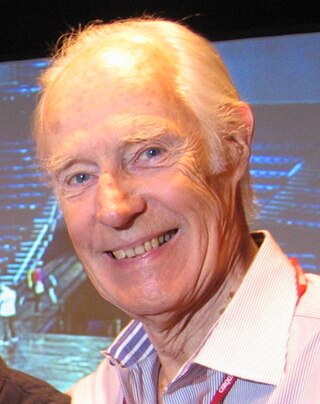
Sir George Henry Martin was an English record producer, arranger, composer, conductor, and musician. He was commonly referred to as the "fifth Beatle" because of his extensive involvement in each of the Beatles' original albums. Martin's formal musical expertise and interest in novel recording practices facilitated the group's rudimentary musical education and desire for new musical sounds to record. Most of their orchestral and string arrangements were written by Martin, and he played piano or keyboards on a number of their records. Their collaborations resulted in popular, highly acclaimed records with innovative sounds, such as the 1967 album Sgt. Pepper's Lonely Hearts Club Band—the first rock album to win a Grammy Award for Album of the Year.

The Quarrymen are a British skiffle and rock and roll group, formed by John Lennon in Liverpool in 1956, which evolved into the Beatles in 1960. Originally consisting of Lennon and several school friends, the Quarrymen took their name from a line in the school song of their school, the Quarry Bank High School. Lennon's mother, Julia, taught her son to play the banjo, showed Lennon and Eric Griffiths how to tune their guitars in a similar way to the banjo, and taught them simple chords and songs.
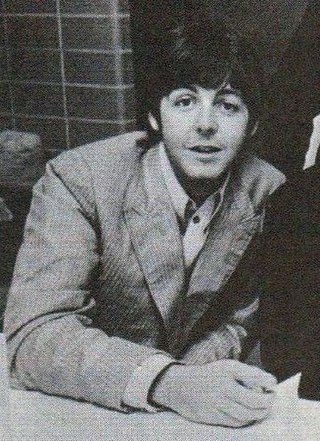
"Paul is dead" is an urban legend and conspiracy theory alleging that English musician Paul McCartney of the Beatles died in 1966 and was secretly replaced by a look-alike. The rumour began circulating in 1966, gaining broad popularity in September 1969 following reports on American college campuses.

"Lucy in the Sky with Diamonds" is a song by the English rock band the Beatles from their 1967 album Sgt. Pepper's Lonely Hearts Club Band. It was written primarily by John Lennon with assistance from Paul McCartney, and credited to the Lennon–McCartney songwriting partnership. Lennon's son Julian inspired the song with a nursery school drawing that he called "Lucy – in the sky with diamonds". Shortly before the album's release, speculation arose that the first letter of each of the nouns in the title intentionally spelled "LSD", the initialism commonly used for the hallucinogenic drug lysergic acid diethylamide. Lennon repeatedly denied that he had intended it as a drug song, and attributed the song's fantastical imagery to his reading of Lewis Carroll's Alice in Wonderland books.

Anthony James "Lonnie" Donegan was a British skiffle singer, songwriter and musician, referred to as the "King of Skiffle", who influenced 1960s British pop and rock musicians. Born in Scotland and brought up in England, Donegan began his career in the British trad jazz revival but transitioned to skiffle in the mid-1950s, rising to prominence with a hit recording of the American folk song "Rock Island Line" which helped spur the broader UK skiffle movement.
The Beatles' bootleg recordings are recordings of performances by the Beatles that have attained some level of public circulation without being available as a legal release. The term most often refers to audio recordings, but also includes video performances. Starting with vinyl releases in the 1970s, through CD issues in the late 1980s, and continuing with digital downloads starting in the mid-1990s, the Beatles have been, and continue to be, among the most bootlegged artists.
Apple Records is a British record label founded by the Beatles in 1968 as a division of Apple Corps Ltd. It was initially intended as a creative outlet for the Beatles, both as a group and individually, plus a selection of other artists including Mary Hopkin, James Taylor, Badfinger, and Billy Preston. In practice, the roster had become dominated by the mid-1970s with releases of the former Beatles as solo artists. Allen Klein managed the label from 1969 to 1973, then it was managed by Neil Aspinall on behalf of the Beatles and their heirs. Aspinall retired in 2007 and was replaced by Jeff Jones. Jones stepped down on 21 October 2024.
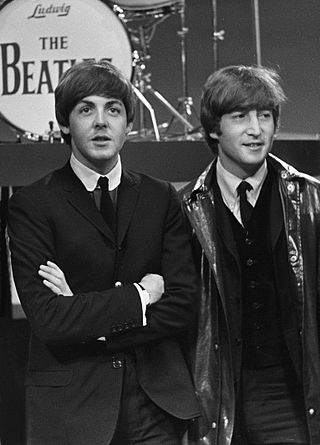
Lennon–McCartney is the songwriting partnership between the English musicians John Lennon (1940–1980) and Paul McCartney of the Beatles. It is widely considered one of the greatest, best known and most successful musical collaborations ever by records sold, with the Beatles selling over 600 million records worldwide as of 2004. Between 5 October 1962 and 8 May 1970, the partnership published approximately 180 jointly credited songs, of which the vast majority were recorded by the Beatles, forming the bulk of their catalogue.

The Plastic Ono Band was a rock band and Fluxus-based artist collective formed by John Lennon and Yoko Ono in 1968-9 for their collaborative musical and sound art projects, films, conceptual art projects and eventual solo LPs. The creation of the Plastic Ono Band, which began in 1967 with Ono's idea for an art exhibition in Berlin, allowed Lennon to separate his artistic output from that of the Beatles.

Donald Christopher Barber was an English jazz musician, best known as a bandleader and trombonist. He helped many musicians with their careers and had a UK top twenty trad jazz hit with "Petite Fleur" in 1959. These musicians included the blues singer Ottilie Patterson, who was at one time his wife, and Lonnie Donegan, whose appearances with Barber triggered the skiffle craze of the mid-1950s and who had his first transatlantic hit, "Rock Island Line", while with Barber's band. He provided an audience for Donegan and, later, Alexis Korner, and sponsored African-American blues musicians to visit Britain, making Barber a significant figure in launching the British rhythm and blues and "beat boom" of the 1960s.
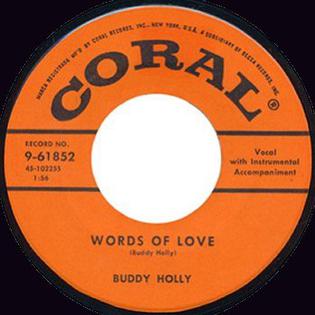
"Words of Love" is a song written by Buddy Holly and released as a single in 1957.

"Don't Let Me Down" is a song by the English rock band the Beatles, recorded in 1969 during the Let It Be sessions. It was written by John Lennon and credited to the Lennon–McCartney songwriting partnership. The band recorded the song with keyboardist Billy Preston; the single release with "Get Back" was credited to "the Beatles with Billy Preston". Originally released as a B-side, producer Phil Spector excluded the song from Let It Be. The song's first appearance on an album was on the 1970 collection Hey Jude.
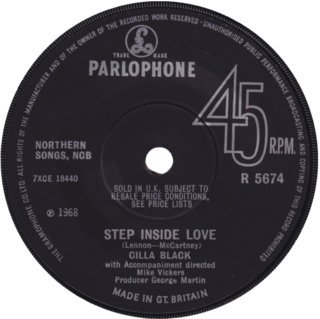
"Step Inside Love" is a song written by Paul McCartney for Cilla Black in 1967 as a theme for her TV series Cilla, which first aired on 30 January 1968.
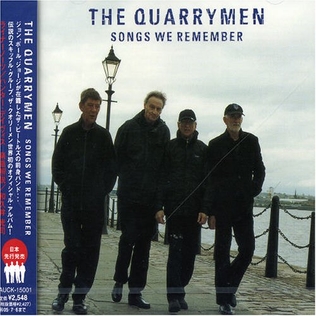
Songs We Remember is the third album by the re-incarnated version of the Quarrymen, which was the band that eventually evolved into the Beatles. It is also the final album to feature founder member Eric Griffiths before his death in 2005.
Marmalade Records was a short-lived British independent record label. Started in 1966 by Swiss-resident Georgian pop impresario and ex-manager of both the Rolling Stones and the Yardbirds, Giorgio Gomelsky, it released records by artists including Julie Driscoll with Brian Auger and The Trinity, who reached No.5 in the UK in 1968 with "This Wheel's on Fire", Blossom Toes, early recordings by Graham Gouldman, Kevin Godley and Lol Creme, who became 10cc, as well as John McLaughlin's first solo album. Marmalade's first release, in August 1966, was a controversial single called "We Love The Pirate Stations", by five well-known musicians masquerading as The Roaring 60's. They were mainly members of the Ivy League, who later went on to release hits as The Flower Pot Men. "We Love The Pirates" was not a hit despite extensive airplay on Radio 270, Radio Caroline and Radio London – it was a half-hearted Beach Boys pastiche at medium tempo, but still well-loved by pirate radio aficionados.
The Beatles were a rock group from Liverpool, England. This timeline chronicles their activities.

"If You Gotta Make a Fool of Somebody" is a song written by Rudy Clark and first recorded by James Ray in 1961. Ray's recording on the Caprice label, arranged by Hutch Davie and produced by Gerry Granahan, reached number 10 on the US Billboard R&B chart and number 22 on the Hot 100 in early 1962.













